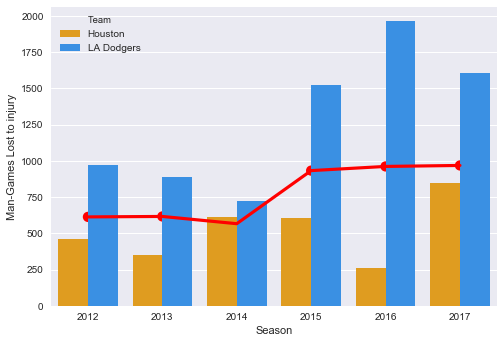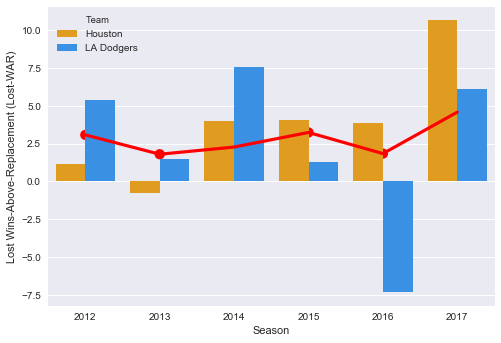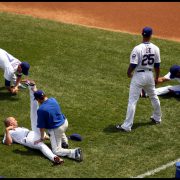Major League Baseball teams defy a simple or clear relationship between player injuries and team performance. The team that has suffered the most injuries since 2010 – the Los Angeles Dodgers – also won the most games in that span. They have been to the National League Champions Series three times, and are now in their first World Series since 1988.
Their opponent, the Houston Astros, are the opposite in almost every way. The Astros lost the second-fewest amount of games to injury since 2010, while also winning the fewest games. In 2013 – as the Dodgers reached the NLCS for what would be the first of three times in five years – the Astros finished their third consecutive season with 100+ losses.
The Houston Astros had fewer man-games lost to injury than the league average (red line in graph) in each of the last six seasons except for 2014. By contrast, the Dodgers led the league in man-games lost in 2016 and 2017, and were fifth in each of the preceding seasons. The Dodgers had anywhere from 1.2 – 7.6 times as many man-games lost as Houston in those years.

The Dodgers’ ability to succeed despite their injuries in these seasons becomes somewhat clearer when measuring lost wins-above-replacement (Lost-WAR) instead of man-games lost. The Dodgers’ Lost-WAR was below the league average in three of the last six seasons. That run includes a -7.3 in 2016 (negative Lost-WAR means the team won more games because the injured players were not in the lineup. Ouch).

Houston had their best Lost-WAR in the depths of their slump. They lost less than a game in 2012, and had a -2.37 in 2013. Since they started their march to the post-season and the World Series their Lost-WAR has been above the league average. This season, on their way to a 101-win season only four years after a 111-loss season, they surrendered the second-highest Lost-WAR in the league: 10.64. Their opponent finished with the 11th worst Lost-WAR in the league and their worst since 2014.
Over the last six seasons there has been little difference between the man-games lost and Lost-WAR between teams that reach the league championships and Major League Baseball as a whole. The only major deviation was in 2016. Both the LA Dodgers and the eventual World Series champions Chicago Cubs had strongly negative Lost-WAR, making 2016 the only year with a negative average.
One interpretation for the surprising lack of correlation between injuries and team performance (measured by wins or post-season appearances) lies with game management. Teams like the LA Dodgers out-perform expectations based on man-games lost. The Lost-WAR metric partially accounts for this by factoring an absent player’s importance to the team.
But a strong manager does more than replace a player one-for-one. He can adjust many aspects of the team’s strategies and lineups to compensate for one or more players – even key players – being unavailable. The unique rules of baseball substitution and how modern managers rotate their lineups – particularly late-inning pitching changes – could explain why baseball does not show predictable patterns like hockey and basketball. Baseball may permit a manager to mitigate the effects of missing players more than other sports.
Injury prevention and game management converge in arguably the most successful team of recent years: the Chicago Cubs. The Cubs reached the National League Championship Series each of the last three seasons, and won last year’s World Series. They had a negative Lost-WAR in 2015 and 2016, and 2.44 in 2017. They have the best Lost-WAR in the Major League Baseball over the last eight seasons: -.33.
The modern Cubs are renowned for their analytical and detail-oriented approach to all aspects of the game. Their injury record and their performance record shows that these two elements are not disparate, but need to be addressed conscientiously and holistically. Their forward-looking approach to analysis helps things make much more sense when looking back at the results.
All data from the invaluable Man-Games Lost. Cover photo by Roy Luck (Flickr / CC BY 2.0)



































































